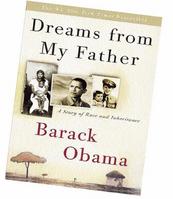Book review: The man who stood for change
Published: Sunday | January 11, 2009

Title: Dreams from my Father
Author: Barack Obama
Reviewed by: Myrtha Désulmé
As a candidate in the recently concluded United States election, Barack Obama electrified the world with his eloquence and charisma, evincing a near-messianic aura. In just months, his name went from being unpronounceable and unretainable, to becoming the most famous on the planet, drawing record-breaking transatlantic crowds; and charming Heads-of-States, paupers, and celebrities alike.
In his first memoir, Dreams From My Father: A Story of Race and Inheritance Obama offers a fascinating autobiographical narrative, which eloquently describes his life in great detail.
The highly personal book was written at age 34, after he was approached by a publisher, following the burst of publicity, which resulted from his election as the first African American president of the Harvard Law Review. Since its re-publication, in 2004, prompted by his winning of the Democratic nomination for a seat as the United States senator from Illinois, the novel topped the New York Times best-seller list, and has dominated best-seller lists ever since.
personal journey
In the preface of the second edition, Obama tells us that his book "speaks to the fissures of race that have characterised the American experience". But that it is in essence, "a personal, interior journey, a boy's search for his father, and through that search, a workable meaning for his life as a black American".
The story begins in New York, where Obama, 21, learns through a phone call from an aunt in Kenya, that his father, who left when he was 2, and whom he met only once during a month-long visit when he was 10-year-old, has died in a car accident.
"I felt no pain," Obama reveals, "only the vague sense of an opportunity lost."
Obama's parents, Barack Obama Sr, of Kenya, and Ann Dunham, of Kansas, meet and marry while studying at the East-West Center of the University of Hawaii at Manoa. He was born in Honolulu in 1961. His parents separated when he is two years old. Obama forms an image of his absent father from stories told by his mother and her parents.
His mother remarries Lolo Soetoro, a student from Indonesia. The family moves to Jakarta, when Obama is six. At age 10, he returns to Hawaii, to live with his grandparents, for the better educational opportunities available there. He attends Punahou School, a private college-preparatory school, where he is one of three black students among the majority Asian American population.
black identity
While being raised by his white mother and grandparents, he connects to his black identity through his peers at school. Through his mother, he is weaned on the romanticism and heroism of the civil rights movement:
"She would come home with books on the civil rights movement, the recordings of Mahalia Jackson, the speeches of Dr King. To be black was to be the beneficiary of a great inheritance, a special destiny, glorious burdens that only we were strong enough to bear."
He writes about his mother, whom he lost to cancer a few months after the book was published, with great affection and admiration:
"I think sometimes that had I known she would not survive her illness, I might have written a different book, less a meditation on the absent parent, more a celebration of the one who was the single constant in my life. What is best in me I owe to her."
Yet, as the book's title suggests, it is mostly concerned with his black father, not his white mother. His search for identity within white mainstream society means that his journey of self-discovery must uncover the black part of him, not the white one.
It is this paradox at the core of Obama's emotional experience, this identity crisis, arising from the fact that his life was shaped by a loving white family, while he felt "utterly alone" in trying to unlock "the puzzle of being a black man" in America, which spawns his obsession to find common ground between the races.
While attending Occidental College, in Los Angeles, a friend of Obama, whom he looks up to for his pure racial lineage, and "his authentic black experience", chides him for reading Heart of Darkness by Joseph Conrad, which he dismisses as a racist tract. Obama argues:
"I read it to help me understand just what it is that makes white people so afraid. Their demons. It helps me understand how people learn to hate."
"And that's important to you?" asks the friend.
"My life depends on it," Obama affirms.
presidential campaign
Much has been made of Obama's unflappable composure and serenity during the presidential campaign. We get a hint at the philosophy behind this self-possession:
"People were satisfied so long as you were courteous and smiled, and made no sudden moves. They were more than satisfied; they were relieved, such a pleasant surprise to find a well-mannered young black man who didn't seem angry all the time."
In a moving passage setting the book's final, emotional scene. Obama visits his father's grave and pours tears of remorse over a man who returned home, but "could not outlive a mocking fate".
What does this book tell us about Obama? His insightful and sensitive depiction of the myriad lives portrayed in this novel is proof positive that he is a "listening" politician. It demonstrates his capacity to provide compelling narrative for the human condition. He comes across as thoughtful, intelligent, and authentic, someone who, when solving problems, knows what he is talking about, because he's been there.
